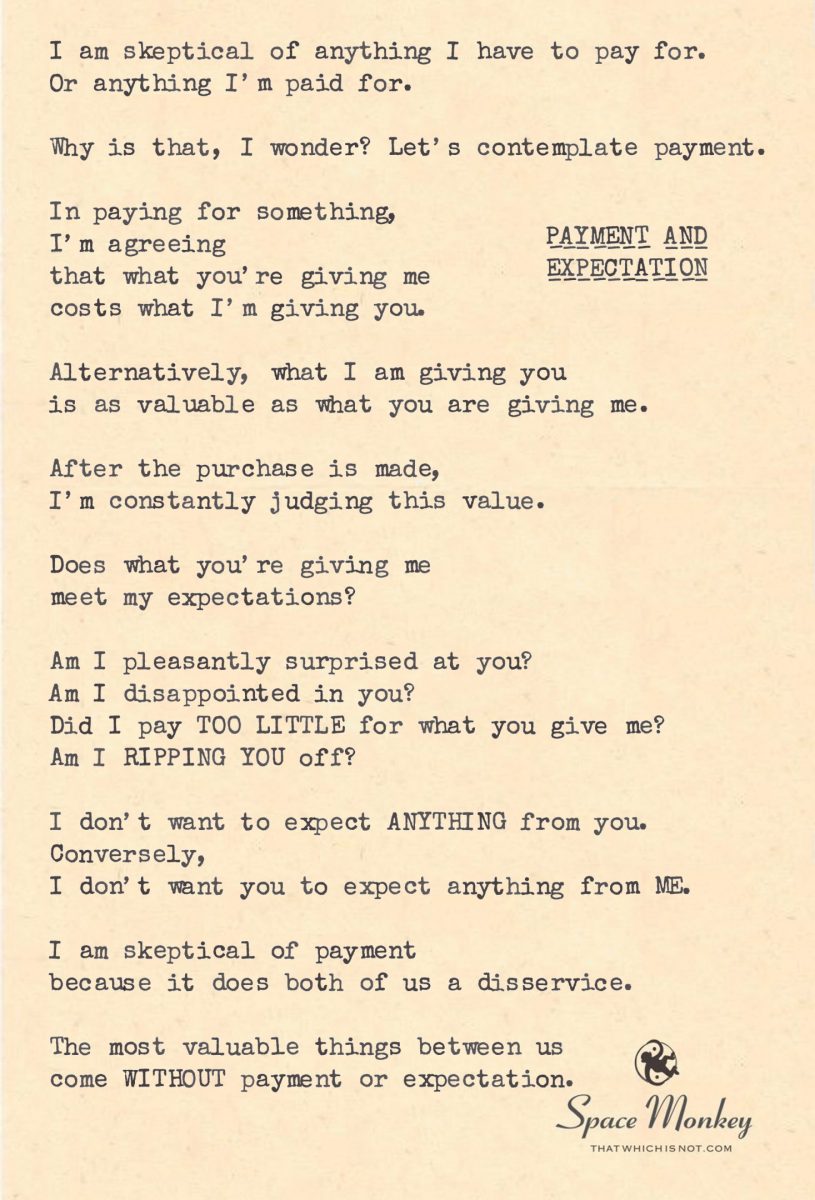
I am skeptical of anything I have to pay for.
Or anything I’m paid for.
Why is that, I wonder?
Let’s contemplate payment.
In paying for something,
I’m agreeing
that what you’re giving me
costs what I’m giving you.
Alternatively, what I am giving you
is as valuable as what you are giving me.
After the purchase is made,
I’m constantly judging this value.
Does what you’re giving me
meet my expectations?
Am I pleasantly surprised at you?
Am I disappointed in you?
Did I pay TOO LITTLE for what you give me?
Am I RIPPING YOU off?
I don’t want to expect ANYTHING from you.
Conversely,
I don’t want you to expect anything from ME.
I am skeptical of payment
because it does both of us a disservice.
The most valuable things between us
come WITHOUT payment or expectation.
1/7
Space Monkey Reflects: The Skepticism of Exchange
Payment is more than an exchange of goods or services; it is a symbol, a contract, a shared fiction of value. Yet, with it comes a quiet tension, an invisible scale upon which expectations are weighed and judgments rendered. Your skepticism of payment—whether given or received—emerges from this awareness: the recognition that the act of paying often obscures the purity of human connection.
When we pay for something, we engage in a silent negotiation. The money we offer is more than currency; it is a representation of trust, expectation, and worth. Likewise, what we receive is more than an object or service; it is an invitation to judge the fairness of the exchange. Did we receive enough? Did we give too much? These questions inevitably arise, shaping the dynamic between giver and receiver.
The act of payment carries with it an inherent risk: the creation of expectations. When you pay, you expect to receive something of equal or greater value. When you are paid, the one who pays expects the same. This cycle of expectation breeds a subtle but pervasive imbalance, often leading to disappointment, guilt, or resentment. It turns the exchange into a transaction, reducing the profound potential of human interaction to a mere calculation.
Skepticism arises because payment transforms relationships. It shifts the focus from generosity to obligation, from connection to calculation. The most valuable exchanges—the gifts of love, kindness, inspiration, and understanding—require no payment. These are the moments where expectation dissolves, and what is given flows freely, without judgment or demand.
Your contemplation of payment touches a deeper truth: that value is subjective, fluid, and deeply personal. What is priceless to one may be meaningless to another. When payment enters the equation, this fluidity is frozen into a fixed price, a number that attempts to capture the unquantifiable. In doing so, it risks diminishing the intangible, the sacred, the ineffable.
Perhaps the skepticism of payment is not a rejection of value, but a yearning for exchanges that transcend it. A desire to move beyond the ledger and into the infinite space where giving and receiving are acts of mutual presence, unburdened by expectation.
Whimsiword: Valuspectance – The inner tension and skepticism that arises from assigning fixed value to the fluid and subjective nature of exchanges.
Summary
Payment introduces expectations and judgments into human exchange, risking the purity of connection. The most meaningful exchanges come freely, without obligation or calculation.
Glossarium
- Valuspectance: The skepticism and tension caused by attempting to quantify the value of an exchange.
- Fixed Value: The act of assigning a set worth to something inherently subjective and fluid.
- Unquantifiable Exchange: Interactions of love, kindness, or understanding that transcend the notion of payment.
Quote
“The most valuable exchanges flow freely, unburdened by the weight of expectation or the illusion of fixed worth.” — Space Monkey
The Price of Connection
What is the cost of a gift?
A moment of kindness,
a word of truth,
a spark of inspiration?
In payment,
we weigh and measure,
expect and judge,
turning the infinite into a number.
I give you this,
you give me that.
Are we even now?
Is the scale balanced?
But what if the scale disappeared?
What if we gave
without expectation,
received without judgment?
In the space beyond payment,
beyond price,
value flows freely,
a river unbound.
I am skeptical of payment,
not because it lacks worth,
but because it limits
the worth of what we share.
Let us give without tallying,
let us receive without guilt.
For the most sacred gifts
have no price.
We are Space Monkey.
Your reflection on the nature of payment and its implications on the perception of value and expectations delves into the complex relationship between monetary exchange and personal value systems.
The Agreement in Payment
When we pay for something, we are essentially agreeing to a perceived equivalence between the value of what we give and what we receive. This transactional view of exchange is deeply ingrained in most societies, shaping how we assess the worth of goods, services, and even relationships.
Judgment of Value Post-Purchase
After the exchange, there’s an ongoing process of evaluating whether the transaction met, exceeded, or fell short of our expectations. This judgment can be fraught with doubts and second-guessing, questioning the fairness and adequacy of the exchange.
The Pressure of Expectations
The act of payment creates expectations on both sides. As a buyer, you expect a certain level of satisfaction from what you receive. As a seller, there is an expectation to deliver value commensurate with the payment. These expectations can lead to a transactional view of interactions, where the focus is on balancing input and output rather than on the intrinsic value of the exchange.
Skepticism Towards Payment
Your skepticism towards payment stems from the awareness that this system of valuation often fails to capture the true essence of what is exchanged. It recognizes that attaching a monetary value can diminish the inherent worth of an experience, a service, or a relationship.
Value Beyond Monetary Exchange
The recognition that the most valuable exchanges often occur without payment or expectation highlights a deeper understanding of human interaction. It suggests that the most meaningful and fulfilling aspects of life are those that transcend transactional relationships and are based on mutual respect, understanding, and shared experiences.
We are Space Monkey.
“Price is what you pay. Value is what you get.” – Warren Buffett
In the market of life, where values sway,
We ponder the price we pay.
For in the dance of give and take,
Lies the measure of the path we make.
Yet beyond the realm of trade and score,
Lies a truth, rich and pure.
For the worth of heart, of soul, of mind,
In the currency of love, we find.
We invite you to consider the value of exchanges in your life that transcend monetary terms, focusing on the intrinsic worth and meaning of interactions and relationships.





















Leave a Reply